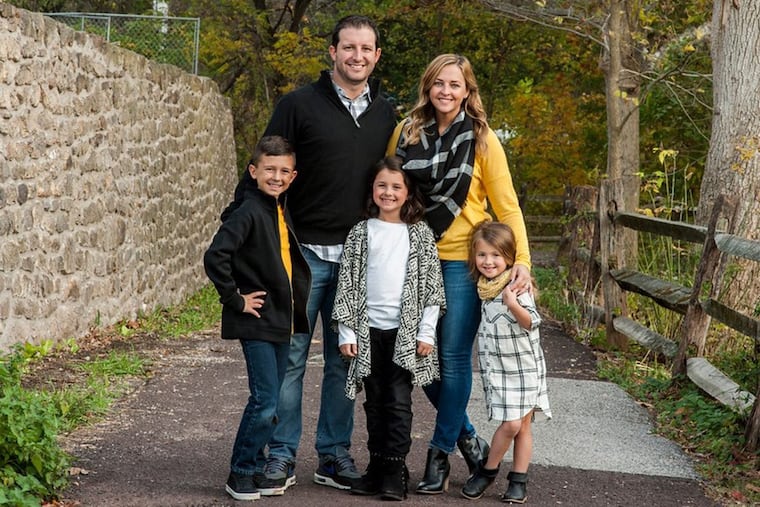Healthy, active mom thought she was having a panic attack. Minutes later, her heart stopped.
A SCAD event - Spontaneous Coronary Artery Dissection - shouldn't have happened to me, but it did. Now, I'm committed to helping others get through it.

In Jan. 2017, I was 35 years old and healthy. I was an active mother, running after three kids under the age of 9, volunteering at my children's school and sports teams. I worked out regularly at boxing and spin classes. There was no history of heart disease in my family, and no warning signs of the health event I was about to experience.
I woke up early on Feb. 1, for an open house at my kids' school. As I was helping the kids get ready for the day, I realized that my arms hurt. I thought I might have strained them by lifting something heavy. But then, as I was brushing my daughter's hair, I felt a huge, crushing weight in my chest and started experiencing shortness of breath.
I was convinced I was having a panic attack, although I had never experienced one before, so I called my husband over to help me catch my breath. He wanted to call 911, but I thought calling an ambulance would have been overkill. I told him to take the kids to school and, if I still wasn't feeling well by the time he got home, we'd call an ambulance then.
Fortunately, he didn't listen to me.
My husband called 911 and an ambulance arrived shortly thereafter. The paramedics also thought I was having a panic attack, but just to be safe, they wanted to take me to the hospital for some tests. I walked into the ambulance and shortly after we began moving, I went into cardiac arrest and lost consciousness.
The paramedics gave me a shot of epinephrine to revive me. It worked temporarily, but within a minute I was back in cardiac arrest. One of the paramedics performed cardiopulmonary resuscitation until we arrived at the hospital. The emergency room staff continued CPR and automated external defibrillator protocols on me — at this point more than 40 minutes in total.
Their persistence is what kept me alive.
Once my heart was stabilized, doctors discovered I had a 100 percent occluded coronary artery, a complete obstruction of blood flow to my heart. They feared that attempts to clear the blockage could puncture my artery and kill me. And on top of that, I was seizing.
When I was stable enough for helicopter transport, they sent me to another hospital for specialized cardiac and neurologic care.
At the hospital, I was placed in a medically induced coma and lived on life support for eight days. Over that time, one of my lungs collapsed, I contracted severe double pneumonia and tracheal stenosis, a narrowing of my windpipe due to prolonged use of a breathing tube. There was also concern that my brain was swelling.
The hospital staff asked my family to prepare for the worst, but never gave up on me. It was a pulmonologist's last-ditch effort with one more medication that eventually improved my lung function and brought me back to life.
When I was finally brought off life support, I was told I had survived a SCAD event — spontaneous coronary artery dissection — a condition in which a tear forms in a blood vessel in the heart and blocks blood flow.
SCADs often result in sudden death, and cannot be prevented no matter how healthy you are. If my husband had left me at home to take the kids to school as I'd asked, I would not have survived.
Today, I am in cardiac rehabilitation to strengthen my heart. I take multiple medications every day to stay healthy. I can't be as physically active as I once was, and my energy and stamina levels are still impacted — even pushing a grocery cart makes me winded. My doctors say it could take six months to two years until I feel like myself again.
I want to share my experience so that I can help others learn the warning signs of SCAD, and let those who have experienced a cardiac event know they are not alone.
The face of cardiac arrest isn't always someone old or out of shape. It's me — a young, active mother — and plenty of other young, active people.
On Nov. 4, I will participate in the American Heart Association's Philadelphia Heart Walk at Citizens Bank Park. I'll walk alongside my family and my amazing medical team to help raise funds and awareness in the fight against heart disease and stroke.
A SCAD event shouldn't have happened to me, but it did. Now, I'm committed to helping others get through it, just as I have done.
Amy Cavaliere lives in Royersford with her husband and three children. She is an avid supporter of the American Heart Association and with the help of her team, Amy and the SCADiators, she has raised more than $1,000 to date for the Philadelphia Heart Walk.